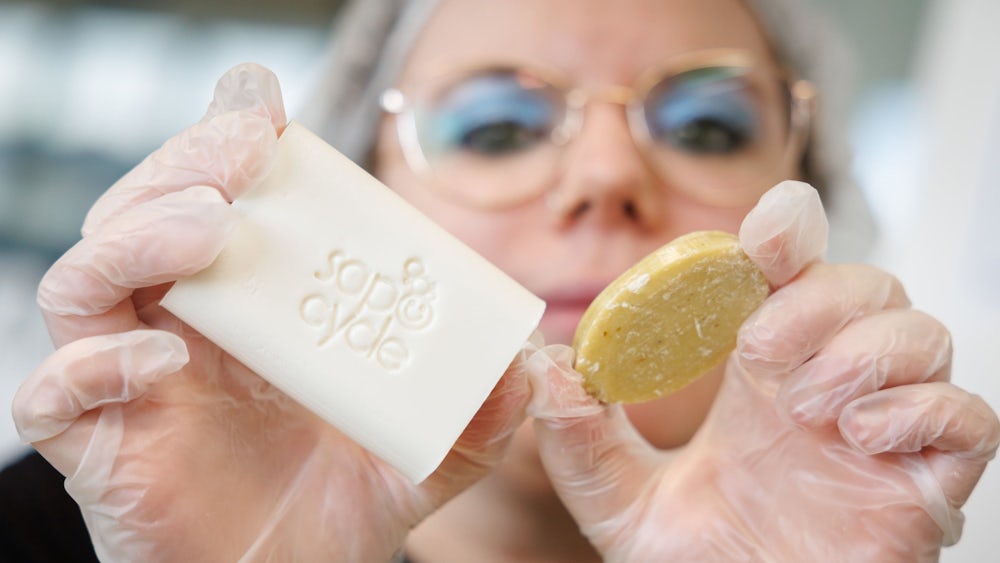Kristian Steko runs the green soap over a slicer three times on each side. Then he passes the piece to his colleague, who carefully works the edges with a vegetable peeler. Another colleague checks the result under a large magnifying glass: there must be no dirt or hair left on the soap. The soaps on the table come from hotels and have all been used. New ones are to be made from them in the Lebenshilfe soap factory in Nuremberg.
Many hotel rooms contain small, packaged bars of soap. Guests usually only use them a few times before they end up in the trash. For hygiene reasons, the soaps cannot be left on the sink for the next guests. This is where the non-profit organization SapoCycle comes in. Bernise Rivière and Astrid Leutner founded it near Munich at the beginning of the year as a German branch of the non-profit organization of the same name in Switzerland. There is also a branch in France.
The aim of the two women: to protect the environment and at the same time help those in need. “Every day, more than five million solid hotel soaps are thrown away worldwide,” says Astrid Leutner. According to the German Hotel and Restaurant Association Dehoga, there are no current figures for Germany. However, with around 44,000 accommodation establishments in Germany subject to sales tax, according to Dehoga, this is likely to add up.
Around 30 hotels in Germany are already working with SapoCycle, explains Bernise Rivière. Around 700 kilograms of soap have been recycled in the last six months, financed by the hotels and donations.
The employees in the soap workshop in Nuremberg, which employs people with disabilities, also benefit from this. The team responsible for recycling has been working at full capacity since then, says sales manager Helmut Mackert. Before, the employees had to take on other work in between. But now there is so much to do that there are plans to develop a machine to support the team.
It is particularly laborious to remove the top layers of the soap. Next to Kristian Steko’s workstation, green soaps are stacked in a box, and soap shavings are piled up under his plane. The soaps cleaned in this way are ground into flour in a high-performance mixer. Mixed with distilled water, this is first pressed into a mass reminiscent of pasta and then formed into new soaps, sometimes green, sometimes white or another color – depending on the original soap.
More than 500 new soaps have been created in this way, which SapoCycle distributes to those in need via food banks or the Nuremberg City Mission. Kristian Steko says he is happy that his work can do something good for people who cannot afford soap. “That makes me happy.”

Not being able to wash your hands or body with soap is something we tend to associate with poorer countries. That is why the Clean The World organization is particularly focused on these countries. It says it recycles soap from more than 8,000 hotels around the world and donates it through aid organizations to people in countries where many people die from respiratory infections such as pneumonia or diarrheal diseases such as cholera.
SapoCycle, on the other hand, deliberately focuses on aid projects in the area – in order to keep the C0₂ footprint as low as possible through short transport routes and because the need is also great in Germany, as the founders explain. In Munich alone, there are 17 food bank distribution points where hygiene products are also distributed, says Astrid Leutner. “So this is always underestimated, and people don’t dare to say: ‘I can’t buy soap.'”
According to Dehoga, many hotels are focusing on greater sustainability and are now using large dispensers for care products. However, it is unlikely that hotels will completely forego cosmetics in their rooms for environmental reasons. At least shampoo and shower gel are mandatory in hotels with at least one star, explains the Dehoga spokeswoman. However, she says that bars of soap and other cosmetic products that are only intended for one room booking will soon be a thing of the past: the EU packaging regulations prohibit this from 2030 onwards.
Leutner does not fear that SapoCycle will then run out of work. “Wherever washing takes place, soap is also needed. There will always be leftovers to recycle – in whatever form.”

